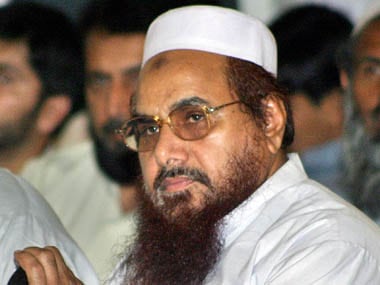Pakistan has decided to ban the Jamaat-ud-Dawa, Haqqani network and ten other organisations putting forth a ‘paradigm shift’ in the country’s security policy, according to a
report
in The Express Tribune. [caption id=“attachment_2047779” align=“alignleft” width=“380”] Jamaat-ud-Dawa chief Hafiz Saeed. Reuters[/caption] The article states that the Peshawar school attack prompted the Pakistani government to take this decision. The report also said that banning the JuD is being seen by analysts as a significant development because its chief Hafiz Saeed is accused of masterminding the 2008 Mumbai terror attacks. Analysts also believe that the decision will be welcomed by India, US and Afghanistan. Moreover, the Haqqani network has been blamed for a bloody bombing of the Indian embassy in 2008 that left 58 people dead, a 2011 attack on the US embassy, and several big truck bombing attempts. US and Afghan officials have repeatedly said Pakistan’s spy agency ISI covertly backed the Haqqanis to extend its influence in Afghanistan, a charge Islamabad denies. “It’s our first step towards execution of the National Action Plan. The nation will see more positive steps towards dismantling militant groups. Both civilian and military leadership decided to ban the Haqqani Network and Jamaat-ud-Dawa,” The Express Tribune quoted a senior Pakistani intelligence official as saying. This move by Pakistan comes after the United States on Tuesday designated Maulana Fazlullah, the chief of the Pakistani Taliban, as a global terrorist and slapped sanctions against him. Tehreek-e-Taliban Pakistan (TTP) had claimed responsibility for the 16 December, 2014 attack on an army school in Peshawar that resulted in the deaths of at least 150 people, mostly children. The announcement by the US had come hours after US Secretary of State John Kerry asked Pakistan to target all terror outfits like the Lashkar-e-Taiba, Taliban and the Haqqani Network that pose a threat to itself, neighbours like India and to the US. “We all have a responsibility to ensure that these extremists are no longer able to secure a foothold in this country or elsewhere,” Kerry had said in Islamabad at a joint press conference with Sartaj Aziz, Pakistan’s National Security Advisor. He had also said militant groups such as the Taliban, the Haqqani network and Lashkar-e-Taiba “continue to pose a threat not just to Pakistan and its neighbours but also to the United States and the world.” (With inputs from PTI)
Jamaat-ud-Dawa chief Hafiz Saeed. Reuters[/caption] The article states that the Peshawar school attack prompted the Pakistani government to take this decision. The report also said that banning the JuD is being seen by analysts as a significant development because its chief Hafiz Saeed is accused of masterminding the 2008 Mumbai terror attacks. Analysts also believe that the decision will be welcomed by India, US and Afghanistan. Moreover, the Haqqani network has been blamed for a bloody bombing of the Indian embassy in 2008 that left 58 people dead, a 2011 attack on the US embassy, and several big truck bombing attempts. US and Afghan officials have repeatedly said Pakistan’s spy agency ISI covertly backed the Haqqanis to extend its influence in Afghanistan, a charge Islamabad denies. “It’s our first step towards execution of the National Action Plan. The nation will see more positive steps towards dismantling militant groups. Both civilian and military leadership decided to ban the Haqqani Network and Jamaat-ud-Dawa,” The Express Tribune quoted a senior Pakistani intelligence official as saying. This move by Pakistan comes after the United States on Tuesday designated Maulana Fazlullah, the chief of the Pakistani Taliban, as a global terrorist and slapped sanctions against him. Tehreek-e-Taliban Pakistan (TTP) had claimed responsibility for the 16 December, 2014 attack on an army school in Peshawar that resulted in the deaths of at least 150 people, mostly children. The announcement by the US had come hours after US Secretary of State John Kerry asked Pakistan to target all terror outfits like the Lashkar-e-Taiba, Taliban and the Haqqani Network that pose a threat to itself, neighbours like India and to the US. “We all have a responsibility to ensure that these extremists are no longer able to secure a foothold in this country or elsewhere,” Kerry had said in Islamabad at a joint press conference with Sartaj Aziz, Pakistan’s National Security Advisor. He had also said militant groups such as the Taliban, the Haqqani network and Lashkar-e-Taiba “continue to pose a threat not just to Pakistan and its neighbours but also to the United States and the world.” (With inputs from PTI)
Pak to ban Hafiz Saeed's Jamaat-ud-Dawa, Haqqani network: Reports
FP Staff
• January 15, 2015, 12:10:37 IST
Pakistan has decided to ban the Jamaat-ud-Dawa, Haqqani network and 10 more organisations for a ‘paradigm shift’ in the country’s security, said a report.
Advertisement
)
End of Article